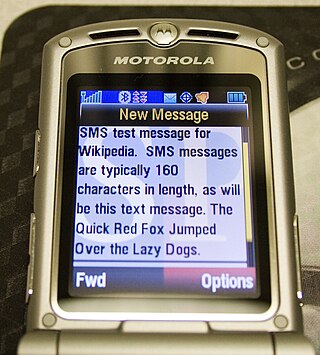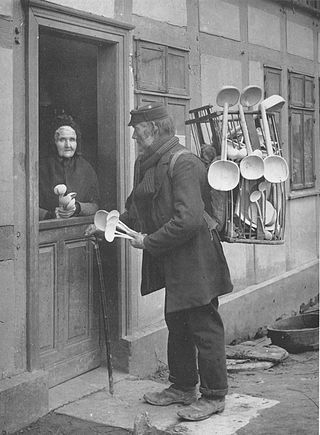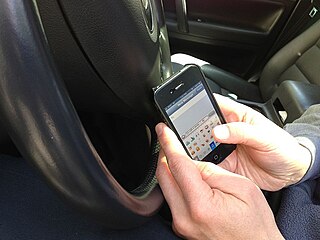
Political text messaging is the practice of sending text messages as part of a political ad campaign. It has grown significantly as a practice in election cycles in the United States since the late 2010s.

Political text messaging is the practice of sending text messages as part of a political ad campaign. It has grown significantly as a practice in election cycles in the United States since the late 2010s.
Text messaging as a tool for voter mobilization and campaigning has been explored for decades; many researchers had been using text messages to increase voter participation. [1] [2] [3] Text messages as a form of political messaging had previously been used sparingly, though the Bernie Sanders 2016 campaign used text messaging as a significant arm of its outreach. [2] However, more recent elections have had significant increases in text messaging, due to decreased costs of texting compared to traditional canvassing. [2] Changes in voter behavior, such as increased smart phone usage, and decreased phone call interaction, have also encouraged political text messaging. [2] [3] [4] Even if only a small minority of individuals respond to each text message, the low cost and large numbers of texts sent out makes political text messaging useful. [4]
There is federal law against sending massive automated texts without consent. [5] [6] However, political campaign texts are often exempt from this law. [6] A 2021 Supreme Court decision (Facebook Inc. vs Duguid et al.) further loosened regulations, [7] [8] suggesting that political texts do not violate a federal ban on robocalls and political campaigns did not need to get recipients' consent as long as they do not use randomly generated numbers. [3] [5] Many political parties and operations are able to retrieve publicly available voter registration information from state election registers, including exact phone numbers. [5] [4] Many also use political data brokers for additional information to target text message recipients. [4] The New York Times reported that enacting meaningful consumer protections will likely require an act of Congress. [8]
In the 2022 election cycle, Americans received more than 15 billion political text messages. [3] The 2024 election cycle is expected to vastly exceed the political text messages received in 2022. [3] [4] Republicans outpaced Democrats by a 2 to 1 ratio with political text messaging during the 2022 cycle. [4] In 2022, as a result of the increase in text messaging, political text messages made up the largest source of complaints to the FCC. [5] Many Americans had a negative reaction to the texts, seeing them as a violation of privacy, and objecting to their often apocalyptic tone and artificial sense of urgency. [8] Political misinformation is another problem, as according to The New York Times , the texts became "a handy method for political actors to quietly propagate the same kind of divisiveness and disinformation that already abounds on social media — only away from the public scrutiny of academic researchers, fact-checking groups and journalists." [8]

Short Message Service, commonly abbreviated as SMS, is a text messaging service component of most telephone, Internet and mobile device systems. It uses standardized communication protocols that let mobile phones exchange short text messages, typically transmitted over cellular networks.
Multimedia Messaging Service (MMS) is a standard way to send messages that include multimedia content to and from a mobile phone over a cellular network. Users and providers may refer to such a message as a PXT, a picture message, or a multimedia message. The MMS standard extends the core SMS capability, allowing the exchange of text messages greater than 160 characters in length. Unlike text-only SMS, MMS can deliver a variety of media, including up to forty seconds of video, one image, a slideshow of multiple images, or audio.

Text messaging, or texting, is the act of composing and sending electronic messages, typically consisting of alphabetic and numeric characters, between two or more users of mobile phones, tablet computers, smartwatches, desktops/laptops, or another type of compatible computer. Text messages may be sent over a cellular network or may also be sent via satellite or Internet connection.

Mobile phone spam is a form of spam, directed at the text messaging or other communications services of mobile phones or smartphones. As the popularity of mobile phones surged in the early 2000s, frequent users of text messaging began to see an increase in the number of unsolicited commercial advertisements being sent to their telephones through text messaging. This can be particularly annoying for the recipient because, unlike in email, some recipients may be charged a fee for every message received, including spam. Mobile phone spam is generally less pervasive than email spam, where in 2010 around 90% of email is spam. The amount of mobile spam varies widely from region to region. In North America, mobile spam steadily increased after 2008 and accounted for half of all mobile phone traffic by 2019. In parts of Asia up to 30% of messages were spam in 2012.

A political campaign is an organized effort which seeks to influence the decision making progress within a specific group. In democracies, political campaigns often refer to electoral campaigns, by which representatives are chosen or referendums are decided. In modern politics, the most high-profile political campaigns are focused on general elections and candidates for head of state or head of government, often a president or prime minister.

Direct marketing is a form of communicating an offer, where organizations communicate directly to a pre-selected customer and supply a method for a direct response. Among practitioners, it is also known as direct response marketing. In contrast to direct marketing, advertising is more of a mass-message nature.

"Get out the vote" or "getting out the vote" (GOTV) describes efforts aimed at increasing the voter turnout in elections. In countries that do not have or enforce compulsory voting, voter turnout can be low, sometimes even below a third of the eligible voter pool. GOTV efforts typically attempt to register voters, then get them to vote, by absentee ballot, early voting or election day voting. GOTV is generally not required for elections when there are effective compulsory voting systems in place, other than perhaps to register first time voters.

The Telephone Consumer Protection Act of 1991 (TCPA) was passed by the United States Congress in 1991 and signed into law by President George H. W. Bush as Public Law 102-243. It amended the Communications Act of 1934. The TCPA is codified as 47 U.S.C. § 227. The TCPA restricts telephone solicitations and the use of automated telephone equipment. The TCPA limits companies or debt collectors from calling clients or prospective customers using automatic dialing systems, artificial or prerecorded voice messages, SMS text messages, and fax machines. It also specifies several technical requirements for fax machines, autodialers, and voice messaging systems—principally with provisions requiring identification and contact information of the entity using the device to be contained in the message.
Voter caging involves challenging the registration status of voters and calling into question the legality of allowing them to vote. Usually it involves sending mail directly to registered voters and compiling a list from mail returned undelivered. Undeliverable mail is seen as proof that the person no longer resides at the address on their voter registration. The resultant list is then used by election officials to purge names from the voter registration rolls or to challenge voters' eligibility to vote on the grounds that the voters no longer reside at their registered addresses.

Cold calling is the solicitation of business from potential customers who have had no prior contact with the salesperson conducting the call. It is an attempt to convince potential customers to purchase the salesperson's product or service. Generally, it is an over-the-phone process, making it a form of telemarketing, but can also be done in-person by door-to-door salespeople. Though cold calling can be used as a legitimate business tool, scammers can use cold calling as well.
Mobile marketing is a multi-channel online marketing technique focused at reaching a specific audience on their smartphones, feature phones, tablets, or any other related devices through websites, e-mail, SMS and MMS, social media, or mobile applications. Mobile marketing can provide customers with time and location sensitive, personalized information that promotes goods, services, appointment reminders and ideas. In a more theoretical manner, academic Andreas Kaplan defines mobile marketing as "any marketing activity conducted through a ubiquitous network to which consumers are constantly connected using a personal mobile device".
A robocall is a phone call that uses a computerized autodialer to deliver a pre-recorded message, as if from a robot. Robocalls are often associated with political and telemarketing phone campaigns, but can also be used for public service, emergency announcements, or scammers. Multiple businesses and telemarketing companies use auto-dialing software to deliver prerecorded messages to millions of users. Some robocalls use personalized audio messages to simulate an actual personal phone call. The service is also viewed as prone to association with scams.

Texting while driving, also called texting and driving, is the act of composing, sending, or reading text messages on a mobile phone while operating a motor vehicle. Texting while driving is considered extremely dangerous by many people, including authorities, and in some places has either been outlawed or restricted. As a form of distracted driving, texting while driving significantly increases the chances that a driver will be involved in a motor vehicle accident.
Social media played an important role in shaping the course of events surrounding the 2016 United States presidential election. It facilitated greater voter interaction with the political climate; unlike traditional media, social media gave people the ability to create, comment on, and share content related to the election.

The Committee to Defeat the President was first established as the hybrid Stop Hillary PAC in 2013. The PAC changed its name to the Committee to Defend the President in 2017. Ted Harvey, a former Colorado state senator, chairs the committee.
Hustle is an American company that provides a peer-to-peer text messaging platform for areas such as politics, higher education, and non-profits. The platform initiates personal conversation between organizations and their targeted supporters or clients. Hustle was founded in December 2014, by Perry Rosenstein, Roddy Lindsay, and Tyler Brock.
Social media use in politics refers to the use of online social media platforms in political processes and activities. Political processes and activities include all activities that pertain to the governance of a country or area. This includes political organization, global politics, political corruption, political parties, and political values. The media's primary duty is to present us with information and alert us when events occur. This information may affect what we think and the actions we take. The media can also place pressure on the government to act by signaling a need for intervention or showing that citizens want change
Turning Point Action (TPA) is an American 501(c)(4) organization, which by law can campaign either for or against candidates running for office. It is an affiliate and the political advocacy arm of the conservative 501(c)(3) Turning Point USA, both founded by Charlie Kirk.

RumbleUp is an American company that provides a peer-to-peer text messaging platform for non-profits, political organizations, and public safety announcements. The platform initiates personal conversation between the staff, supporters or designated representatives of organizations and their targeted supporters or clients. It was founded in December 2017 by Thomas Peters.
Facebook, Inc. v. Duguid, 592 U.S. 395 (2021), was a United States Supreme Court case related to the definition and function of auto dialers under the Telephone Consumer Protection Act of 1991 (TCPA) to send unsolicited text messages. In a unanimous decision based on statutory interpretation of the TCPA, the Supreme Court ruled that auto dialers are defined by their function to either store or produce telephone numbers from a random or sequential number generator.